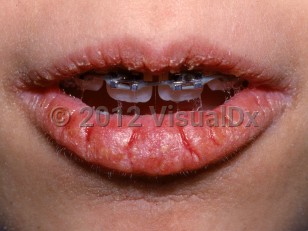Cheilitis - Oral Mucosal Lesion
Alerts and Notices
Important News & Links
Synopsis

Cheilitis is one of the more challenging oral problems to diagnose and treat. Many cases represent a factitial disorder related to lip-licking habits, and it can be difficult to convince patients that the vermilion zone of the lip should be dry (the "wet line" is the demarcation between the labial mucosa and vermilion zone).
Some cases of cheilitis are related to contact hypersensitivity reactions to compounds found in products that commonly come into contact with the vermilion zone of the lip, including cosmetics, lip balms, toothpastes, and sunscreens (oxybenzone [benzophenone-3]).
Other cases of cheilitis are due to candidal infection related to chronic lip-licking or to the use of petrolatum-based materials that are applied to the lips. The petrolatum seals in moisture, allowing the candidal organism to thrive in the moist keratin that results.
Retinoids (isotretinoin and acitretin) are also frequent causes for this problem. High doses of vitamin A, lithium, chemotherapeutic agents (busulfan and actinomycin), d-penicillamine, isoniazid, and phenothiazine have also been reported to cause cheilitis.
Related topics: actinic cheilitis, angular cheilitis, exfoliative cheilitis
Codes
K13.0 – Diseases of lips
SNOMEDCT:
7847004 – Cheilitis
Look For
Subscription Required
Diagnostic Pearls
Subscription Required
Differential Diagnosis & Pitfalls

Subscription Required
Best Tests
Subscription Required
Management Pearls
Subscription Required
Therapy
Subscription Required
Drug Reaction Data
Subscription Required
References
Subscription Required
 Patient Information for Cheilitis - Oral Mucosal Lesion
Patient Information for Cheilitis - Oral Mucosal Lesion- Improve treatment compliance
- Reduce after-hours questions
- Increase patient engagement and satisfaction
- Written in clear, easy-to-understand language. No confusing jargon.
- Available in English and Spanish
- Print out or email directly to your patient


